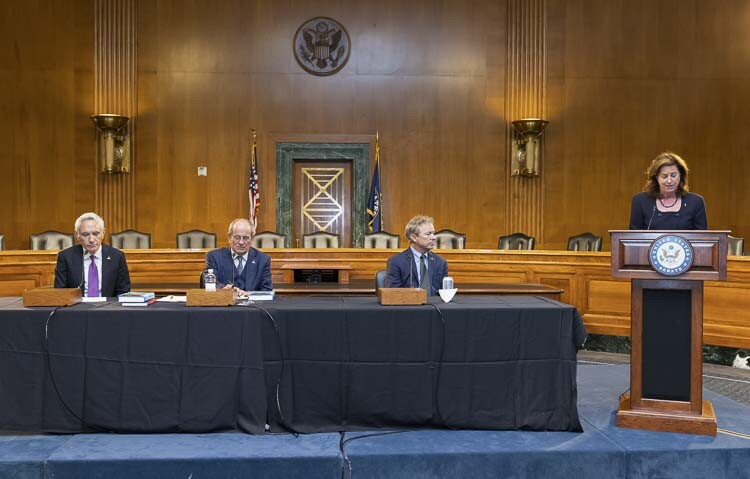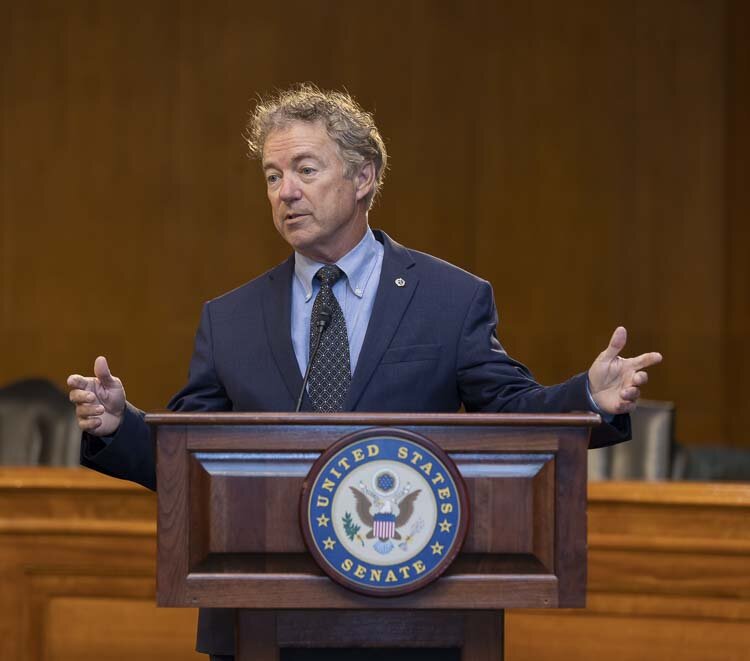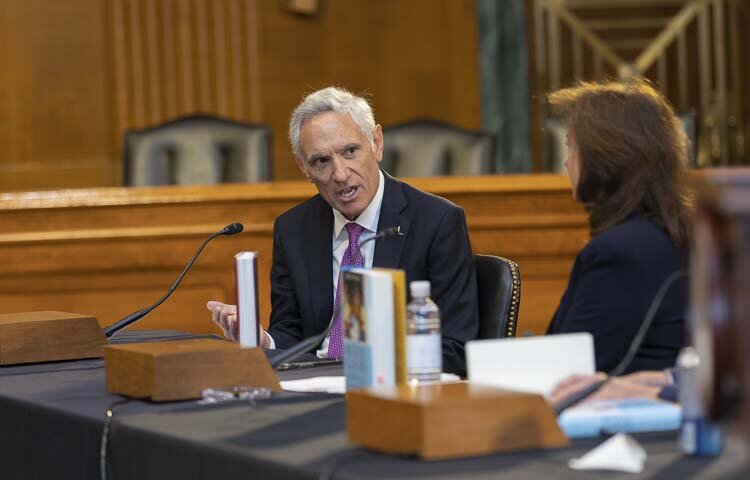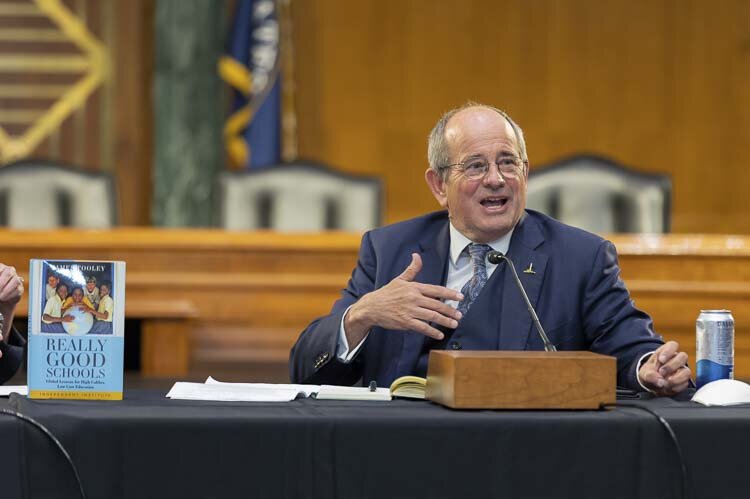
Reporter Jessica Hofer Wilkinson shares details of the discussion that took place at the ‘Crisis to Opportunity’ event Sept. 27 in Washington DC
Jessica Hofer Wilkinson
For Clark County Today
While the 2023-24 academic school year is well underway for America’s schoolchildren, the devastating effects of government-imposed lockdowns, school closures, and other public health policies in the wake of the COVID-19 pandemic are still permeating classrooms, homes, and hospitals nationwide.
That was the topic of discussion Wednesday, Sept. 27, when Senator Rand Paul of Kentucky, Dr. Scott Atlas of Stanford’s Hoover Institution, and education expert Dr. James Tooley convened on Capitol Hill to address the grave harms committed against America’s children over the last three years and what sort of corrective actions could lead our nation’s children forward.
Senator Rand Paul kicked off the “Crisis to Opportunity” event, calling attention to the deep-seated corruption of the government officials who steered the nation’s response to COVID-19, like Dr. Anthony Fauci.
“The same government official who covered up the lab-leak theory of COVID’s origin lied during sworn testimony to Congress about gain-of-function research sponsored by the US government,” Paul said. Fauci is one of the “same government officials who promoted school closures and lockdowns for healthy children.”

Fauci, who resigned after 54 years at the National Institute of Health (NIH) in December 2022, was the face of the federal government’s response to COVID-19 for both the Trump and Biden administrations. He wielded immense influence over the country’s public health policies, including recommendations for masking, social distancing, and stay-at-home orders for healthy schoolchildren, despite recent deflections on the matter.
Fauci’s impact on such measures eventually led Senator Paul to propose an amendment to eliminate Fauci’s position before his resignation, calling him a “dictator-in-chief.”
Paul, a longtime opponent of extreme COVID measures like lockdowns, mask mandates, and the military’s COVID vaccine mandate, reminded Wednesday’s audience, “These bureaucrats have yet to be held accountable for their actions against the American public, and likely the world.”
His frustration is shared by many, including Dr. Scott Atlas. Atlas is the Robert Wesson Senior Fellow at the Hoover Institution at Stanford University, Senior Advisor at the Independent Institute, and author of “A Plague Upon Our House,” a book that details his effort to promote sensible, data-driven policies within the White House’s COVID Task Force.
Atlas was an early advocate for a more measured approach to public health policy rather than sweeping mandates, which caused him to receive enormous media and political backlash in early 2020 when he said of the country’s pandemic response, “Children are literally being destroyed.”

Need for government accountability and reform
Three years later, loads of data support Paul and Atlas’s early and steady positions. But, personal vindication is not what they seek. They want government accountability, reform, and assurance that future public health threats or other emergencies will not be used to justify harm to future generations of Americans.
To his audience on Capitol Hill, Atlas echoed the CDC’s report of an explosion of anxiety and depressive disorders in teenagers and college-age students over the last three years. He said one of every four college students thought about killing themselves due to lockdown-imposed isolation.
Relying on hospital emergency department data, the CDC knew as early as May 2020 that suicide attempts among adolescents aged 12-17 spiked following school closures, 31 percent higher than in 2019. The following year, they found a 50 percent increase in emergency department visits for suspected suicide attempts among girls ages 12-17.
Unnecessary school closures and lockdowns
To those who say school closures and lockdowns were necessary in the face of an unknown threat, Atlas emphasized, “We knew in the Spring of 2020 that the risk of this disease to children was minuscule. We also knew children were not a significant source of spread.” At the time, the best available data demonstrated that those aged zero to 19 had a survival rate of 99.9997 percent when the virus was “in its most lethal form.”
And yet, the United States remained an “outlier” in how long it kept public schools shuttered, likely influenced by the NEA and AFT teacher’s unions, whose emails obtained via Freedom of Information Act (FOIA) requests, demonstrated significant influence over the CDC’s guidelines for school reopenings.
According to UNESCO, the US kept its schools closed for 62 weeks, compared to 27 weeks in its sister nation, the UK. Some countries, like Sweden, never closed primary schools at the national level.
When schools finally did reopen across the US, the National Center for Education Statistics within the Department of Education said government schools reported a 70% increase in students seeking mental health services since the start of the pandemic.
Substance use disorders skyrocketed for teenagers, and unwanted weight gain plagued more than half of college students. The sudden increase in all-cause pediatric mortality is the most shocking of all statistics, however.
In March 2023, the Journal of the American Medical Association (JAMA) Network, which included an author from the University of Washington, Seattle Children’s Research Institute, published an article identifying this alarming trend. The country’s previously declining pediatric mortality rate suddenly reversed with the COVID-19 pandemic, but “COVID-19 contributed little to this surge.” In their words, “A nation that begins losing its most cherished population – its children – faces a crisis like no other.”
“America really failed,” Atlas said when referring to how healthy students were force tested, quarantined when asymptomatic, and mandated “injections of experimental drugs with no clear benefit to them.”
“It’ll take decades to understand the damage that was done to children,” Atlas remarked.
None of these statistics touch on the highly-covered loss of learning experienced by America’s schoolchildren since the onset of the COVID-19 pandemic, substantiated by the nation’s latest report card from the National Assessment of Educational Progress (NAEP).
With steep declines in math and reading scores at the eighth-grade level, public school students in the state of Washington performed similarly to public school student averages across the country in 2022. They lost about a decade of improvement in one year. And children from low-income families suffered the worst.
The impact of the ‘learning poverty’
In 2022, the World Bank estimated the “learning poverty” caused by COVID-19 school closures could result in a loss of “$21 trillion in potential lifetime earnings” for this generation of students.
According to education expert Dr. James Tooley, the impact of the government’s COVID-19 edicts on children, devastating and pervasive as they were, may have an unintended sliver of a silver lining- Educational freedom.

Tooley is the Vice-Chancellor (President) of the University of Buckingham in England, where he also serves as Professor of Educational Entrepreneurship and Policy. He was formerly the Global Head of Low-Cost Schools for GEMS Education, and his work was highlighted in the PBS Documentary “Meet the New Heroes,” as well as a documentary for BBC World and BBC Newsnight. He is best known for his ground-breaking research on private education for people experiencing poverty in India, China, and Africa.
Tooley’s study of the world’s poorest families and how they educate their children eventually took him to 22 countries across four continents, earning him the title “a 21st century Indiana Jones” from Philanthropy Magazine. His latest book, “Really Good Schools,” details how educational independence from government-sponsored schools leads millions of the world’s poorest families to new opportunities for social and economic advancement. It shows that “student success need not be held hostage to bureaucratic inertia, vested interests, and chronic underperformance.”
“The poorest of the poor do not acquiesce to the government schools,” Tooley told his DC audience, referencing his research of private schools in impoverished parts of India, Ghana, and Nigeria. “They do not acquiesce to mediocrity.”
In his book, Tooley spells out how entrepreneurs can create low-cost private schools throughout North America, the UK, and the rest of the developed world in a way that follows the lessons learned by the world’s poor. Calling for micro-schools, hybrid schools, more private schools, and more homeschooling, Tooley sees private entrepreneurship as a means to eliminate the catastrophic impact of school closures, low performance, and achievement gaps in government schools.
American parents, he pointed out, are already doing this.
According to the National Center for Education Statistics (NCES), public school enrollment fell by 3 percent following the COVID-19 pandemic, wiping out a decade of enrollment growth.
The EdWeek Research Center surveyed principals and superintendents of public schools across the country who said homeschooling was driving enrollment declines “more than any other single reason” since the onset of the COVID-19 pandemic.
Families opt to homeschool children
In the fall of 2020, the US Census Bureau reported that the number of families choosing to homeschool had doubled, reaching 11.1 percent of households. In households where respondents identified as Black or African American, the proportion of homeschooling multiplied five times.
Of the enrollment changes, Tooley said, “Parents saw the curriculum schools were using with their children,” via remote learning during school closures, “and they were disturbed.” “They saw how little time and attention was granted their children,” and they decided they could find a better alternative.
Now, the Home School Legal Defense Association (HSLDA) estimates 7 to 8 million children in the US are homeschooled.
The National Home Education Research Institute finds that homeschooled children typically score between 15 and 25 percentile points above their public school peers on achievement tests, regardless of their parent’s level of education or household income. Black homeschooled students scored between 23 and 42 percentile points above Black public school students, according to a 2015 study.
Researchers from Brown University wrote in the fall of 2020 that “politics, far more than science, shaped school-district decision-making” in the wake of COVID-19. “Mass partisanship and teacher union strength best explain how school boards approached reopening.” They found, however, that the threat of enrollment declines impacted school districts. For example, “Districts located in counties with a larger number of Catholic schools were less likely to shut down and more likely to return to in-person learning” for fear of losing students to other schools.
Private school options and homeschool resources could benefit those remaining or leaving the public school system if competition does, in fact, influence policies, as researchers at Brown found in some cases. And it’s the kind of educational entrepreneurship Tooley envisions benefiting the most disadvantaged.
Many factors at play in Washington state
Vancouver’s Heidi St. John of the Firmly Planted Homeschool Resource Center is one of dozens of such entrepreneurs in Clark County who help facilitate affordable, accessible resources and support for homeschoolers in the area. The volunteer-driven non-profit organization might be one of the reasons the number of families who report homeschooling in Clark County has increased since the start of the pandemic, but many factors are likely at play.
In the state of Washington, each school district must complete a Home-Based Student Annual Report (HBI) identifying the number of families that filed declarations of intent to homeschool (for students over 8). A comparison of HBIs filed by school districts in Clark County, which includes the Battle Ground, Camas, Ridgefield, La Center, Green Mountain, Evergreen, Vancouver, and Washougal School Districts, from the 2019-20 to 2022-23 school years shows a significant increase in declarations of intent to homeschool across every school district in Clark County except the Green Mountain School District, which decreased by one student. A total of 2,521 students (over 8) were reported to be homeschooled in Clark County for the 2022-23 school year, compared to 1,644 in 2020.
Though calculated differently, private school enrollment in Washington State also increased for every grade level but eleventh grade over the same time. These developments mirror changes across the nation and likely represent a growing dissatisfaction with public schools, ever amplified due to government-imposed lockdowns, school closures, and other public-health-related student mandates.
Here lies the opportunity, according to Tooley.
“We cannot stay silent and let a vocal minority dictate what happens to our children,” concluded Dr. Scott Atlas.
Jessica Hofer Wilkinson is a freelance writer, home educator, mother of four and nursing home chaplain. She resides in Clark County.
Also read:
- Opinion: Why Bob Ferguson is wrong and what SMF is doing about itSilent Majority Foundation challenges Bob Ferguson over alleged rights violations in federal lawsuit.
- Silent Majority Foundation files lawsuit on behalf of former state employees who were terminated under policy requiring a COVID-19 vaccineSilent Majority Foundation files a lawsuit on behalf of former state employees alleging constitutional violations over a COVID-19 vaccine mandate.
- Letter: New movie on COVID vaccine victims deserves a watchRichard Beamish discusses the documentary on COVID vaccine victims, urging viewers to watch.
- Vancouver screening scheduled of ‘Vaxxed III: Authorized to Kill’Vancouver screening of ‘Vaxxed III: Authorized to Kill’ scheduled for Sept. 18 at Vancouver Mall 23.
- Study: Risk for getting COVID rises with each shotA new report from the Epoch Times warns that the more COVID shots an individual has taken, the higher the risk of getting COVID.
- ‘That’s a scandal’: CDC knew COVID shots caused deaths, but lied with public denialsA new report from the Epoch Times reveals its investigation shows that the CDC knew of the links between the COVID shots and death – and lied about them.
- FDA agrees to remove anti-ivermectin posts off the internet in lawsuit settlementThe Food and Drug Administration has reportedly settled a lawsuit brought by three doctors who accused the health regulator of interfering with their ability to practice medicine and prescribe Ivermectin to treat COVID.
- No good news about student learning on 4-year anniversary of COVID school closuresFour years ago this month, schools nationwide shut down as COVID-19 numbers skyrocketed and students were sent home for what was initially planned to be two weeks.












